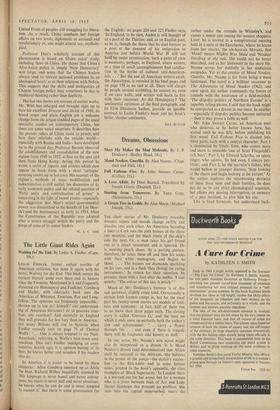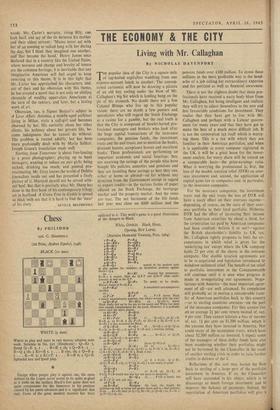Dreams, Obsessions
Starting from Tomorrow. By Tony Gray. (Heinemann, 21s.) A Green Tree in Gedde. By Alan Sharp. (Michael Joseph, 25s.) THE short stories of Mr. Donleavy resemble dreams; scenes and moods change swiftly and dissolve into each other. An AmeriCan boarding a liner at Cork sees the pink houses of the shore one moment, and the black rivets of the ship's side the next. Or, a man takes his girl friend out to a smart restaurant and is ignored. He is wearing peach shoes. As a parting gesture, therefore, he takes these off and then his socks with their white monogram, and begins to shout. . . . The waiters see diamonds sparkling on his toes, and in a flash 'they [bring] the eating instruments.' In return for their attention, he presents them with a foot after the melba. 1 said quietly. "The colour of this too, is peach."' Much of Mr. Donleavy's humour is of this sad, quizzical, slightly crazy kind, Occasionally a certain Irish feyness creeps in, but for the most part his twenty-seven stories are models of taut- ness and economy: in fact, half of them run to no more than three pages each. The closing story is called 'Gustave G,' and the note on which it ends sums up perfectly both the author's aim and achievement: `. . carry a flower through life . . . and even if there is tragedy there will be fragrance and beauty as well.'
In one sense, Mr. Neame' s new novel might also be interpreted as a dream. It is Maud Noakes's dream (and determination) that Africa shall be restored to the Africans. She believes in the power of the panga—the darkie's equiva- lent to the flick-knife—and in some lecture notes, printed in the book's appendix, she cites examples of 'Black Superiority.' In London there is a warrant out for her arrest, but for a woman who is a cross between Joan of Arc and Lady Hester Stanhope this presents no problem. She sails into the capital unperturbed, meets the author under the rotunda in Whiteley's, and causes a minor riot among the women shoppers. Later, he is invited to a conspiratorial meeting held in a suite at the Dorchester., where he learns from her master, the six-foot-six Mwami, that 'Maud' means Mighty War Maid and 'Noakes' Dwelling at the oak. She could not be better described, and as her lieutenant in the story Mr. Neame serves her dutifully in her audacious escapades. Yet as the creator of Maud Noakes, Guerilla, Mr. Neame is far from being a mere lieutenant. The novel is a brilliant successor to The Adventures of Maud Noakes (1962), and once again the author commands the forces of comedy with the assurance of a field-marshal. The drip-dry politics of Northern Europe' is a superbly telling phrase. I said that the book might be interpreted as a dream in one sense. In another —especially if drip-dry politics become universal —then it may prove a fable as well.
Mr. John Stewart Carter, an American poet who deserves to be better known here, has waited until he was fifty before publishing his first novel. Full Fathom Five is divided into three parts, each with a central character. Part 1 is dominated by Uncle Tom, who comes more and more to resemble 'one of Scott Fitzgerald's rich boys'; Part 2, by Edward Sciarrha, an opera singer, who admits, 'In bed even, I always per- form'; and Part 3, by the narrator's father, who would bellow at younger doctors, 'Stop looking at the charts and begin looking at the patient.' As the author explores the interweaving destinies of these three men and their families, he does not do so in any strict chronological sequence, but allOws any passing interruption, or memory of a past incident, to give him his cue.
Life is lived forwards, but understood back- wards. Mr. Carter's narrator, rising fifty, can look back and say of the tie between his mother and their eldest servant: 'Mama never sat with her of an evening or talked long with her during the day, but I think they imagined one another, and that became the bond.' Henry James once declared that in a country like the United States, where newness and change and brevity of tenure are the common heritage, it is inevitable that any imaginative American will feel urged to keep reverting to this theme. It is in this light that Mr. Carter has approached his characters, and, out of their and his obsession with this theme, he has created a novel that is not only an abiding chronicle of wealthy upper-class Americans at the turn of the century, and later, but a lasting work of art.
Obsession, too, is Signor Buzzati's subject in A Love Affair. Antonio, a middle-aged architect living in Milan, visits a call-girl and becomes obsessed by her. His curiosity about her other clients, his jealousy about her private life, be- come indulgences that he cannot do without. The problem is treated adultly, but has been more profoundly dealt with by Mario Soldati. Joseph Green's translation reads well.
Starting from Tomorrow is about free-lancing as a press photographer; playing up to bank managers; wanting to seduce an pair girls; being sacked; drinking too much; and general pro- crastinating. Mr. Gray knows the world of Dublin journalism inside out and has presented a lively picture of it. Mustard should not be served with- out beef. But that is precisely what Mr. Sharp has done in the first book of his contemporary trilogy set in Scotland. A Green Tree in Gedde is spread so thick with sex that it is hard to find the 'meat'































 Previous page
Previous page